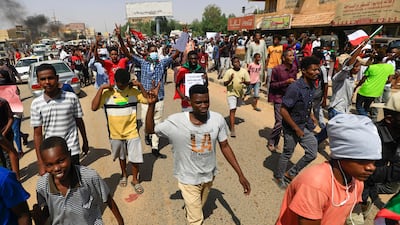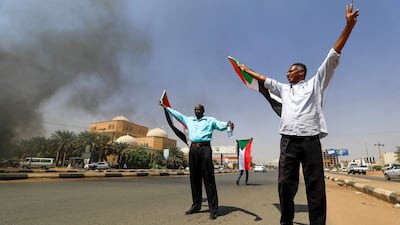Hundreds of thousands took to the streets of Khartoum and cities across Sudan on Thursday to call for the country's transitional leader, Gen Abdel Fattah Al Burhan, to step down.
In the capital, motorists hooted their car horns and motorcyclists wove in and out of protesters waving the country's white, green, red and black flag.
Crowds chanted slogans dating back to the 2018-19 uprising against the rule of dictator Omar Al Bashir.
That uprising, known among Sudanese as the “December revolution”, eventually led to Al Bashir's removal by his generals in April 2019.
“Freedom, peace and justice,” they screamed. “Revolution is the choice of the people.” “Give it up, Al Burhan.”
The demonstrations were called by the Forces of Freedom and Change, a pro-democracy alliance that operates as the power base or political sponsor of the government led by Abdalla Hamdok, a former UN economist in office since August 2019.
In a symbolic but important decision, the FFC picked October 21 as the day of the demonstrations, commemorating the start of an uprising that toppled the six-year regime of military strongman Ibrahim Abboud in 1964.
"We must complete the realisation of the revolution's goals," said Ayah Al Houry, 32, an office worker, as she marched with others from her Khartoum residential district. "We need the revolution to move forward and make our country better."
Mr Hamdok, in televised address on Thursday night, commended the demonstrators for their peaceful conduct.
“I salute the millions who came out today in cities and villages across Sudan to reassert their adherence to the civilian and democratic transition,” he said, wearing a traditional Sudanese white robe and head gear.
“There will be no going back on the goals of the revolution.”
Hours before the demonstrators poured into the streets, an eerie quiet descended on the city, with most shops shut and little traffic on the roads.
The area surrounding the army headquarters near the downtown district was sealed off.
But the quiet was soon shattered when hundreds of thousands began to march towards three destinations in the capital: the plaza outside Parliament in Khartoum's twin city of Umm Durman; and Airport Road and 60th Street, both in eastern Khartoum.
The crowds grew steadily bigger under a clear sky and temperature of nearly 40°C.
But the heat did not appear to dampen the enthusiasm of the protesters, who chanted energetically and waved flags in a generally jubilant atmosphere.
But the party-like vibe of the demonstrations did not dilute the intended message. The FFC continues to be capable of mobilising the masses, who insist Gen Al Burhan must hand over the reins of power to a civilian, as stipulated in a power-sharing deal reached between the FFC and the military in August 2019.
Thursday's protests were generally peaceful, except for a brief outbreak of violence between protesters and police in Umm Durman.
Police said a small group of protesters pelted officers outside Parliament's building with rocks, firebombs and tear gas.
Police said they responded with a "legal amount of crowd-breaking measures".
"The protesters later torched a police truck and loot its contents. Several policemen were injured, including two with gunshot wounds."
Zarrouq Al Mubarak, 52, a government employee who took part in Thursday's protest, said: "We are here to reassert the necessity of civilian rule.
"We will not stage a sit-in. We will go home at the end of the day and let the government handle the situation."
Ali Ammar, a protest leader from the FFC, urged supporters of the government “to fill the streets across the country to safeguard the civilian rule and democratic transition".
“Our protest will not come near the Presidential Palace or the Cabinet building, so there would be no friction with protesters," he said on Wednesday, referring to a pro-military protest camped near the palace.
Pro-military supporters also urged marchers to be peaceful.
On Wednesday the US warned Sudan that American support could be withdrawn if the transition to civilian rule was impeded, in a clear message to the military not to try to seize power or interfere with the shift to democracy.
“If the transition is interrupted, if one side or the other in this [civilian-military] partnership tries to prevail, then the US support for all of these issues, including debt relief, will be in question,” US special envoy for the Horn of Africa Jeffrey Feltman told The National on Wednesday.
This year, the US has provided about $337 million to support Sudan's transitional government.
Gen Al Burhan has repeatedly stated his support for the transition to democratic rule, but he has been showing signs of political ambitions.
The FFC is made up of professional and trade unions, as well as political parties and rebel groups. It was the main force behind the months of deadly street protests that prompted the military to remove Al Bashir.
Relations between the military and the FFC-backed government have been fraught with tension since a failed coup attempt last month, with both sides announcing their differences for the first time.
The military and its supporters openly called for Mr Hamdok’s government to step down. The FFC says the military wants a government it can influence.
FFC demands include handing over to a civilian the leadership of the Sovereignty Council, a body that in theory operates as a collective presidency and is chaired by Gen Al Burhan.

Also on the list is the restructuring of the military to purge Al Bashir loyalists and absorb paramilitary groups.
The FFC says intelligence and security agencies should be placed under the direct supervision of the government, not the generals as is the case now.
































